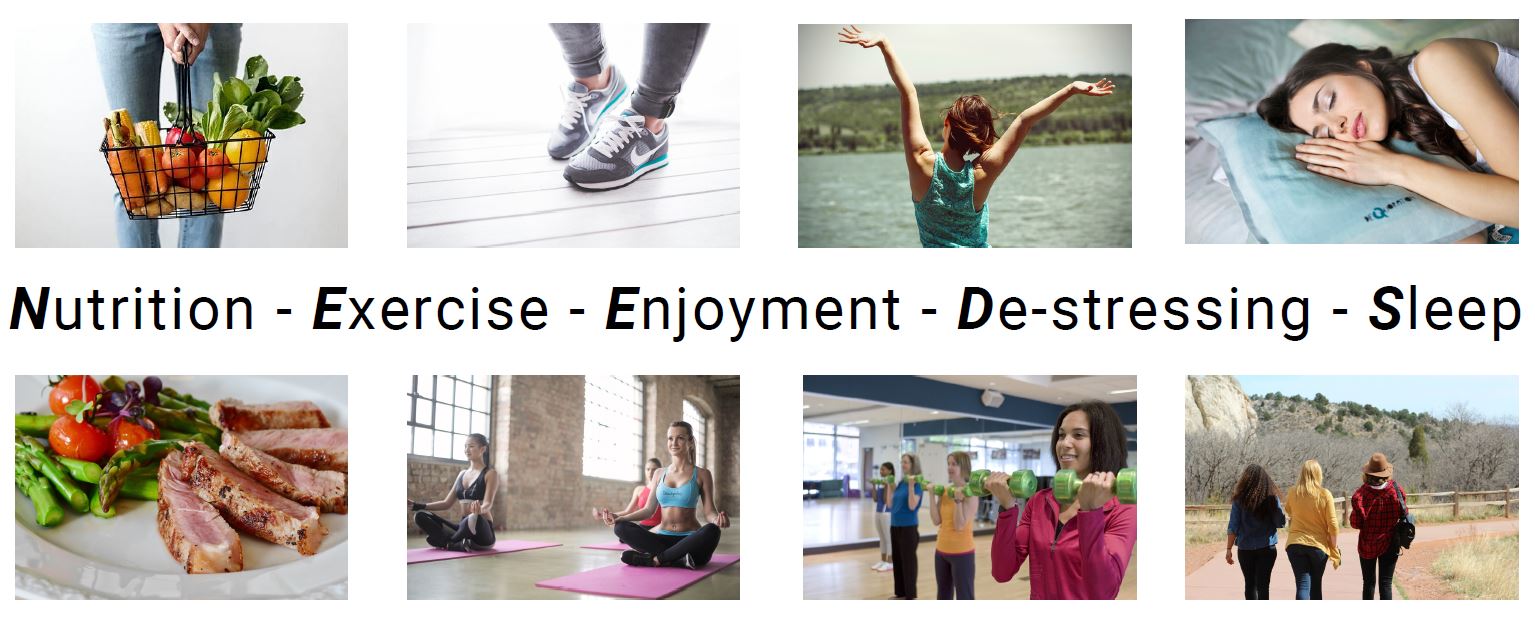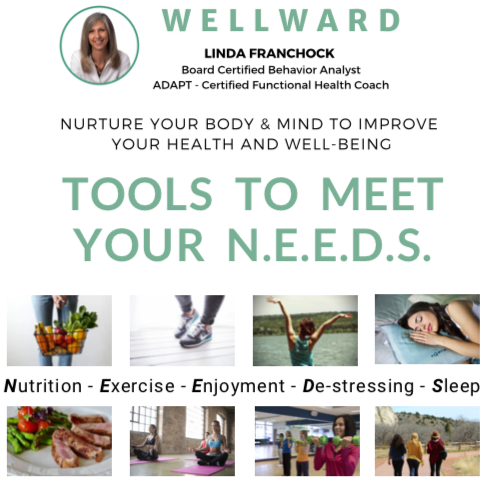Eight years ago, I decided to change direction.
I got on the road to better health.
In this article I’ll share how you can do this too, why it’s so important and additional resources to get you started.
HEALTH AND WELLNESS IS A PROCESS – NEVER A STATIC STATE
My journey began by making necessary lifestyle changes over time.
Sleep deprivation, lack of exercise and poor food choices did not support the healthy life I envisioned in my future. I was stressed to the max and not doing many things I previously enjoyed.
Today I’m very thankful for those changes! Especially considering the current situation with COVID-19. My immune system is strong, my stress level is low, and I’m healthy overall.
It was hard work but work worth doing.
I refer to these changes as meeting my N.E.E.D.S. (Nutrition, Exercise, Enjoyment, De-stressing, and Sleep). These N.E.E.D.S. are critical to everyone’s health and well-being. And if neglected over time can trigger disease.
The good news – research shows that many diseases can be reversed and avoided with lifestyle changes.
“Evidence over the past 20 years from a variety of sources, including epidemiological, prospective cohort, and intervention studies, has documented that physical activity, diet, and combined activity and diet interventions can mitigate progression of chronic disease and in fact reverse existing disease.”
THE GOAL
The goal is not just the absence of illness or disease in our lives. That’s only a neutral point. I encourage you to go beyond a neutral point and as far into wellness as possible.
High-level wellness simply defines choices we make over things we can control in life, including our behaviors. This makes all the difference in the quality of life!
MEETING YOUR N.E.E.D.S – NUTRITION, EXERCISE, ENJOYMENT, DE-STRESSING, AND SLEEP
Below are five areas considered critical N.E.E.D.S. to developing and maintaining health and wellness.
Gaining knowledge about each area builds awareness that helps us make choices that drive us farther into wellness and farther away from illness.
- Start by taking a detailed look at each of the critical N.E.E.D.S. – Nutrition, Exercise, Enjoyment, De-stressing practices, and Sleep.
- Consider your vision and values related to each.
- Consider where you’re doing well and where you can make a change.
- Take my wellness quiz and receive an immediate score and feedback to help you determine an area of priority.
- Explore possibilities and determine your personal direction for change.
- Contact me if you would like to use your complimentary coaching session to discussion a wellness plan. There’s no obligation.

1. EAT NUTRIENT DENSE FOODS
Nutrient dense foods are whole foods that are unprocessed and unrefined. They are in their natural state as much as possible. These are fresh fruits and vegetables, unprocessed meats, non-industrial seed oils.
Research shows that a diet rich in nutrient dense whole foods supports weight loss, boosts energy, improves sleep, reduces inflammation, and can prevent and reverse a wide range of chronic diseases. It has beneficial effects on cardiovascular function, supports healthy immune function and bone health and improves gut health. You can avoid many modern-day diseases with the simple introduction of sources of nutrient dense whole foods.
On the other hand, eating excessive quantities of foods loaded with industrial seed oils, gluten and refined sugar on a daily and cumulative basis puts you at risk of developing a variety of chronic diseases such as type 2 diabetes, heart disease, stroke, cancer, Alzheimer’s disease, and obesity, to name a few.
Minimizing the cumulative toxic load from foods such as bread, pastries, muffins, crackers, cookies, cereals, soda, fruit juice, prepackaged and fast food containing artificial ingredients and chemicals is critical to your long-term health and well-being.
Unfortunately, 70% of the total calories Americans consume each day come from these categories leading to the overwhelming rise in chronic illness in our country.
Though it’s difficult to eat 100% of these foods all of the time, the benefits are overwhelmingly positive for adding them to your daily meals as much as possible.
If you’re eating mostly whole foods that are unprocessed and unrefined, keep it up! Stay strong with maintaining your healthy lifestyle!
If you eat mostly processed, prepackage and fast foods, consider the following:
- What small changes can you make to move you closer to eating more nutrient dense whole foods?
- What information could you access to help you learn more?
- What support would help you in the process?
If you don’t pay attention to what you eat consider the following:
- What would help you consider the benefits of nutrient dense whole foods for your life?
- What small steps would you be willing to try toward incorporating more nutrient rich foods in some part of your week?
- Who could support you in learning more about nutrient dense whole foods?
2. EXERCISE
Active living is key to optimal well-being. Regular exercise helps prevent many chronic diseases and health issues. The Physical Activity Guidelines for Americans recommend that adults get at least 150 minutes of moderate-intensity aerobic physical activity or 75 minutes of vigorous-intensity physical activity, or an equivalent combination each week.
The benefits of regular exercise include reduced stress hormones, enhanced mood and outlook, improved self-confidence and increased connections with nature. It aids in the prevention of cognitive decline, boosts brain function and memory, helps to control addiction, increases productivity and creativity, and better physical and mental performance.
If you’re exercising 1 – 3 days per week, excellent! You’ve got a great start!
- If possible, what additional time would you like to devote to your current exercise routine?
- What other forms of exercise interest you?
If you not exercising at all consider the following:
- What’s holding you back from experiencing the benefits of exercise?
- What have you tried in the past that’s worked?
- What support would you find helpful?
If you’re over-exercising and not benefiting from your current program, consider the following:
- What are some benefits of scaling back your current program?
- What support do you need in determining a better plan?
3. EXPERIENCE ENJOYMENT
Play is important for adults. Play is defined as being something done for its own sake, not to achieve a goal. Something highly enjoyable, voluntary, and fun. Where you lose a sense of the passing of time.
Playfulness is associated with many positive behaviors including learning, productivity, creativity, flexibility, optimism, empathy, and the capacity to handle stress. It encourages cooperation, promotes problem solving, and fosters a sense of community and belonging.
Play is all about perspective! If you play once per week or daily, fantastic! If not, consider the following:
- What play can you incorporate in your life at least once a week or a month?
- What play can you incorporate in your daily life?
- What easy, fun things could you consider as play?
If you never have time for play, I’m sorry you’re missing out.
- What opportunities do you have to add play to your life if you explored your time?
- How could you begin incorporating just a few hours into your month?
- Is there a small step you could take toward adding in play?
The pleasure experiences you enjoy from your social connectedness and social system are supporting your health and well-being and can be included in the play category.
Social connections provide pleasurable experiences that are essential to your health. The experience of pleasure releases powerful hormones and chemicals in your body like endorphins and oxytocin that promote health and prevent disease.
Pleasure protects you against the harmful effects of stress, it strengthens and regulates the immune system, and it improves mood.
Having a positive social support system has been shown to extend lifespan and improve cardiovascular, endocrine, immune, and mental health. Of all the types of social support, emotional support is the most consistent predictor of health.
If you play once per week or daily, fantastic! You are reaping the benefits of play!
If your social lifestyle if fairly isolated, consider some ways to cultivate social connections and build relationships.
- What things do you enjoy doing where you could meet others?
- What success have you had in the past when connecting with people?
- What different ways can you connect? (i.e. phone, online, in-person, in a class, etc.)
If you’re struggling with too many social connections, consider the following:
- What would you like to change?
- What would help make your social life more manageable?
- What social connections are most beneficial in your life?
4. PRACTICE DE-STRESSING
Positive stress, called eustress, is a type of good stress that’s crucial to have in your life. It keeps you energized, excited and motivated about life. You would have a lack of meaning in your life without it. The anticipation of an upcoming vacation, a new job, wedding or the anticipation of a roller coaster ride are examples of eustress. Without eustress you would be bored, depressed and unmotivated to accomplish anything.
Negative stress called distress occurs when you perceived things as outside of your ability to cope. It can be short or long-term. It causes unpleasant feeling such as anxiety and decreases our ability to perform.
Research shows long-term negative stress increases the risk for serious and chronic conditions such as…
- heart disease
- diabetes
- hypothyroidism
- autoimmunity (triggers or worsens autoimmune diseases)
Additionally, it negatively affects your cognitive function and mental health and harms the body’s ability to maintain homeostasis for optimal health, such as blood pressure and glucose for example. Negative stress depletes our metabolic reserve, diminishes our resilience, and leads to blunted cortisol response.
Unfortunately, a great diet, exercise plan, and supplements are not beneficial if stress is a serious, unresolved problem.
Stress management has several benefits. It improves mood and energy. It boosts immune function, promotes longevity, increases productivity and focus, reduces the risk of chronic disease, helps maintain healthy body weight, and much more.
If you have positive stress management skills and minimal stress in your life, congratulations!
- What things you can do to ensure you keep this balance?
If you’re dealing with stress and don’t have positive ways of managing it, you are likely faced with very challenging days that could be adversely affecting your health.
- What simple changes could you incorporate in your life to minimize exposure to stress and its harmful effects?
- What stress management skills would you like to learn?
- What support could you seek to help with stress management?
Whether you’re currently in a job, enjoying retirement, changing careers, going to school, performing volunteer work, and/or providing caregiving, consider the effects of stress on your life.
- Is stress negatively affecting your life?
- What small changes can you make to reduce the risk to your health and well-being?
- What support can you seek for the changes you want?
5. SLEEP
Sleep is an uncontested requirement for optimum health. Research suggests that 7 to 9 hours of sleep per night is required for the majority of people.
Sleep enhances memory and mental clarity, improves athletic performance, boosts mood and overall energy, improves immune function, and increases stress tolerance. It’s essential for basic maintenance and repair of the neurological, endocrine, immune, musculoskeletal and digestive systems.
Excessive sleepiness can have diverse and serious consequences. Reduced cognitive function can compromise judgment and performance, increase risks of motor vehicle incidents, home and work-related incidents, and make it difficult to gain or maintain employment. It can lead to abuse of caffeine, pills and energy drinks that have detrimental effects on your overall health.
If you’re regularly getting 7 – 9 hours of sleep each night, keep up your great sleep habits! If you’re not, consider the following:
- What’s keeping you from a good night’s sleep?
- What steps can you take to improve your sleep habits?
- What small changes could you make to start improving your sleep?
SUMMING IT UP
Many chronic health issues are due to long-term, unresolved issues like stress, sleep deprivation, poor nutrition, lack of exercise and deprivation of enjoyment.
Research shows that abuse and neglect in these areas of your life can result in serious and many times chronic health issues.
If you’re reaping the benefits of a healthy lifestyle that meets all of your N.E.E.D.S. Congratulations! Stay strong with maintaining your health and well-being!
If you’re not reaping the benefits of a healthy lifestyle, it’s never too late to make a change. Starting with a small, doable step can make a huge difference in your overall health and wellness over time.
Over to you…
As you reflect on your N.E.E.D.S., which stands out as the most balanced?
If you were to work on one area of your N.E.E.D.S., what area would you work on first?
What health or wellness conditions are you currently dealing with that could be improved by working on an area of your N.E.E.D.S.?
Wishing you Wellward! Linda
- Take the Wellness Quiz right now. It’s a brief 2-minute quiz to find out your wellness score. It’s FREE. You’ll receive an immediate email with your results and feedback.
- Download my free ebook “Tools to Meet Your N.E.E.D.S” for 19-pages of resources to support the change you desire.

Sign up today to receive the “Tools to Meet Your N.E.E.D.S.” ebook, which contains Linda’s favorite products and practices for wellbeing.
You’ll also get notified about new resources and learning opportunities from Wellward.
Discover over 200 resources to help you reach optimal health and wellness. Explore links, apps, books, articles, podcasts, videos and more!





